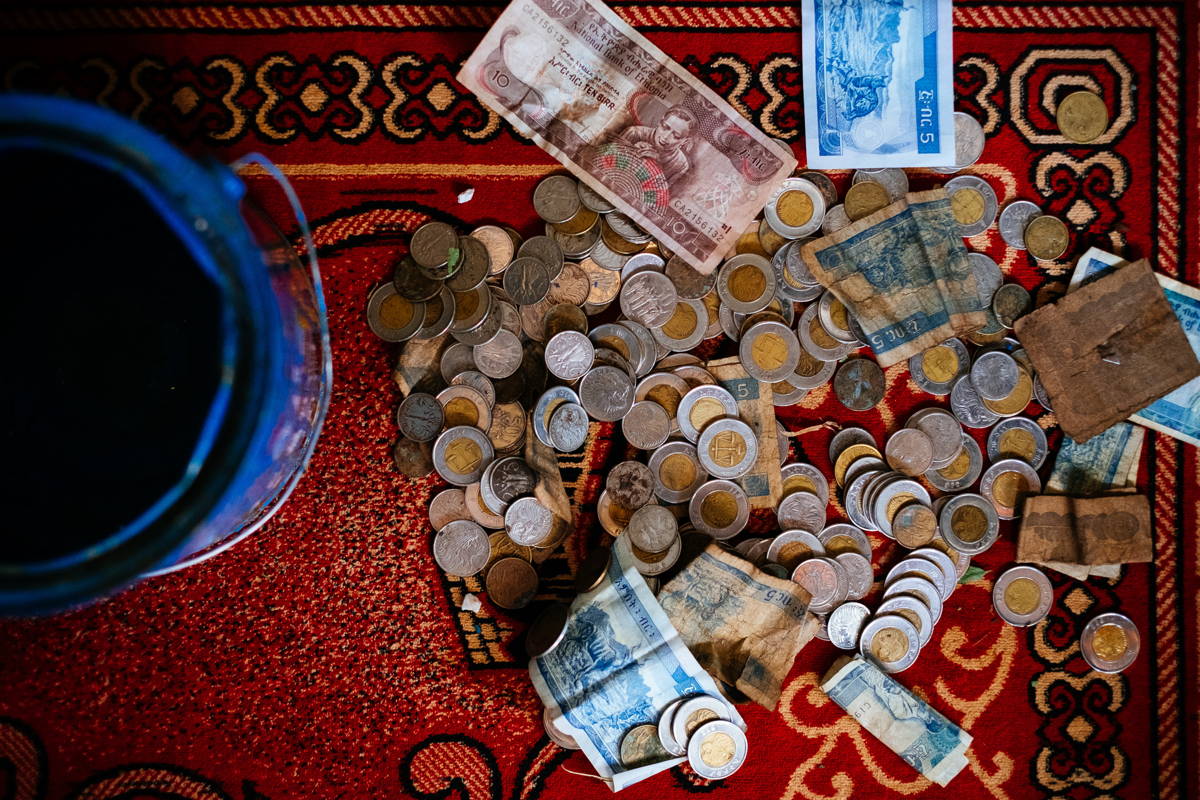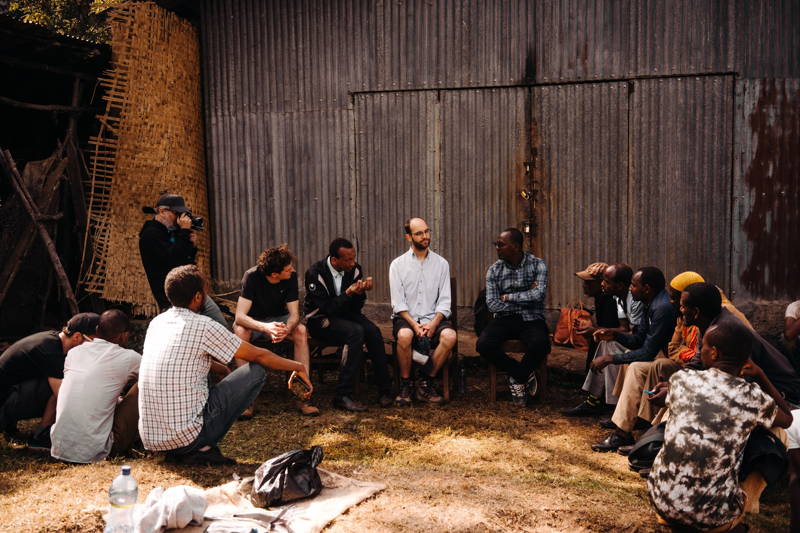

A contribution from Martin Elwert from 26 October 2018
For the past few weeks, I’ve been thinking a lot about the prices we pay as Coffee Circle to our green coffee partners. The reason is the alarming development of the world market price for coffee, which fell below the mark of 1 USD/lb in September for the first time in over 10 years. The world market price for coffee in the meantime has reached a worrying low. Although the world market price is independent from the prices we pay, it still has a major impact on our partners worldwide.
What is the world market price? The world market price is an average price over all world-traded coffees, i.e. the variety Arabica, regardless of quality, country of origin and also production costs. That means it contains both coffees that are harvested efficiently in Brazil, for example by machine, on highly productive coffee plantations, but also the coffee of the Ethiopian peasant farmer, who has old unproductive coffee trees in their garden, which they harvest by hand.
Why has the world market price for coffee dropped so much?
The reasons for price fluctuations in the coffee trade are complex and not easy to explain. Ignoring the influence of hedge funds and their bets on rising and falling prices, the main driving force for price fluctuations is simply the supply and demand for coffee. Meaning, if we have a strong harvest, there is plenty of coffee and the price goes down. Fearing a tight harvest, the price rises.
Currently, we can see an annually growing worldwide overproduction of coffee. According to the International Coffee Organization, the international consumption of coffee, with 162 million bags, increased by about 1.8 % compared to the previous year. Coffee production exceeds this value by 2.6 million bags. (Coffee beans are traded in „bags“, with one bag containing 60 kg of green coffee beans). This oversupply lowers the coffee price.
Update März 2019
Welchen Beitrag leisten wir mit den Preisen, die wir für unseren Rohkaffee an die Farmer und Kooperativen bezahlen? Dafür müssen wir herausfinden, wie hoch die Produktionskosten des Kaffees für die Farmer sind. Dazu war ich in Agaro, West-Äthiopien, und habe Interviews mit Kaffeefarmern geführt.
What is the effect of falling prices for our partners?
As we buy only part of the harvest from our partners, the remaining volume is distributed by other means. Often, this remnant is sold through local exchanges that correlate with world market prices, although specialty coffee is produced at a much higher cost. At the end of the harvest, the mixed calculation of the cooperative is significantly worse. At the current world market price, this leads to the fact that the production costs of coffee are higher than the price farmers receive for it. And that’s alarming, since coffee is the livelihood of millions of farmers and their families.

Using the world market price as a benchmark for fair pay is fundamentally wrong. Why?
The production costs per country are so different that we therefore do not know whether we pay the Ethiopian farmer a fair price, even though we pay him four times the world market price. We are not alone with this problem. At this point, even the specialty coffee scene, which focuses on transparent trade and fair wages for coffee farmers, still has no answer yet. For all „direct trade“, „farm gate“, „fair xyz“ promises, I do not know of any roaster who can be 100 % sure that they are paying a truly fair price, unless they grow their own coffee and therefore know their production costs.
Even though we often used the comparison to the world market price, because it is easy to understand, we are increasingly uncomfortable with it. As a rule, transparency ceases with the purchase price (FOB price = Free on Board). This is then compared with the world market price.
The world market price is not a valid comparison value in order to derive a fair payment. And the fact that it is the best point of reference we have in terms of fair prices is no longer enough for me.
However, concluding from the comparison that x-times the world market price is fair, is similarly misleading or simply false, as is stating that fair trade ensures fair prices. The underlying problem is the same: the comparison with a global average price, without taking into account the differences in production costs of individual countries. The only thing we can deduce from this is that we pay more fairly than the world market. However, it doesn’t matter whether the price we pay is fairer than the world market, but whether the price is higher than the cost of production. For Coffee Circle, this means that we will begin to ensure that the prices we pay are certainly higher than our partners‘ production costs.
This is a mammoth task, as even our partner cooperatives and coffee farmers do not know their production costs. But if we can’t figure that out together, Specialty Coffee may end up not being the solution to poverty, but the path to poverty. And that would be the opposite of what we, as Coffee Circle, originally stood for.
☝ In 2017, the average purchase price for all our coffees was 100 % above the world market price. But what exactly does this value say?
Transparent Trade Coffee Movement
In the recent past, coffee roasters have formed an action group called Transparent Trade Coffee (TTC) for the „transparent trade coffee movement“ in the specialty coffee sector. In this movement, roasters transparently share their purchase prices for their coffees, with the aim of sensitizing their customers to the topic and providing the producers with reference prices for coffees. Here, the so-called „Return to origin“ (RTO) is considered. It defines what percentage of the sales price of roasted coffee in comparison to the purchase price of green coffee, the so-called FOB price (Free On Board), remains in the origin. For example, if we paid 3.10 USD/lb for our Limu coffee in Ethiopia, the RTO would be about 30 %. For our Colombian Sierra Nevada coffee, the RTO would be around 23 % for 2.50 USD/lb. Basically, this action group is a step in the right direction as it voluntarily provides more transparency. However, the RTO is not a good comparative indicator in the international comparison of different roasters who have different costs. In addition, the coffee regions are fundamentally different, which makes comparability increasingly complex.
What can we do about it?
As the Coffee Circle, we will continue to pay prices that are well above the world market price. But that alone is no longer enough. To ensure that coffee gives our partners a perspective and that we pay fair prices, we need to go one step further and determine the production costs of our partners.
Production costs include all costs incurred by the farmer until he sells his freshly harvested coffee cherries to a cooperative where the coffee cherries of many farmers are washed and dried. These costs are difficult to grasp, as we do not know what labor costs and maintenance costs are incurred by the farmer over the year. How many people are employed at the coffee farm and what are the costs of maintaining the coffee farm.
We are currently in the process of setting up a project in Ethiopia to reflect the real production costs of our partners for the first time. As far as we know, nobody has ever charged it 100 %. We are grateful for any hints. The results of this project will then provide us with the information we need to know what we have to pay under local conditions to really pay our partners a fair price. This is the only way to ensure that our partners in Specialty Coffee for reason see a perspective.
We hope that we can start the project this harvest. If the pilot is successful, we will expand this approach step by step. We will keep you up to date. Keep your fingers crossed that it works out!
Our recommended reading list

Martin Elwert
Martin ist seit 2010 Gründer und Geschäftsführer von Coffee Circle. Martin treibt die Vision des Unternehmens voran und ist für die Umsetzung unserer Projekte in den Anbauländern verantwortlich.